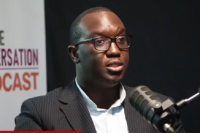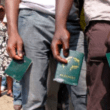HOME Affairs Minister Stephen Kampyongo has called on the European Union to support the Zambian government in establishing holding facilities for irregular migrants who are currently being held in correctional facilities.
Speaking when he virtually launched the EU global promotion for best practices for children in migration in Lusaka, Wednesday, Kampyongo urged the EU and the UN agencies to broaden the spectrum of children covered under the project to also cater for internal migration.
“Ladies and gentlemen, may I appeal to the European Union and the United Nations agencies to consider supporting interventions that protect children in both internal and transnational migration. I am reliably informed that this project only covers children in cross-border migration. So, I am also requesting that we broaden the spectrum of where we focus our interests in so far as children on the move are concerned,” Kampyongo said.
“May I further appeal to the EU, especially to support the government in establishing holding facilities for irregular migrants. The current practice of detaining migrants in our correctional facilities, together with common criminals, is not in line with international best practices. So, this call, I think which was equally made earlier for us is a very key one. So, we must try to do whatever we can to undertake this mammoth task. Like I have said, this establishment of facilities will be in the best interest of all those that are on the move and that will ensure the respect for their rights. This is because irregular migrants have peculiar needs, which may not be taken into account in correctional facilities.”
He also reaffirmed government’s commitment to a human rights-based approach management of migrants without compromising national security.
“I want to reaffirm, ladies and gentlemen, our government’s commitment to a human rights-based approach management of migrants without compromising national security. And, indeed, I will agree with you Your Excellency, the Ambassador of the EU, that we need to have a coordinated national response in these matters and at the centre of it all, must be the security interest. The Ministry of Home Affairs stands ready to further support all efforts aimed at protecting children in migration, including the embracing of documented best practices and discouraging detention of children except as a matter of last resort, while observing that children’s best interest are taken care of,” he added.
And Kampyongo expressed government’s commitment to the protection of all children regardless of their immigration status.
“We are totally committed to protecting all children regardless of their immigration status. As a testimony of this commitment, Zambia is a signatory to the Convention on the Rights of a Child and many other international and regional instruments propagating the rights of children. Ladies and gentlemen, the government has continued to initiate interventions aimed at mitigating challenges faced by children in migration. Notable among them being the development and enactment and setting-up of the following: the National Child Policy of 2015; the National Social Protection Policy of 2014; the ongoing development of the National Migration Policy; the Child Code Bill and the Review of the Antihuman Trafficking Act No. 11 of 2008; the setting-up of shelters for vulnerable persons, including unaccompanied and separated children in Chipata, Sesheke and Chongwe, including Mansa,” Kampyongo said.
He further noted that inadequate capacity among the first-line officials in managing children in migration remained one of the challenges Zambia still faced.
“The government is alive to the fact that despite the interventions, the country continues to face a number of challenges in protecting children in migration, which include; gaps in policy migration; inadequate shelter, especially alternative shelter for male children in migration and inadequate capacity among the first-line officials in managing children in migration,” said Kampyongo.
“I am glad, however, to note that the project we are launching today (Wednesday) as I am reliably informed will focus on the following aspects among others: policy strengthening; case management; mental and psychosocial support and alternatives to detention. I should mention here that the Government of the Republic of Zambia is, indeed, grateful to the United Nations, European Union and the whole of the international community for their continued technical and financial support to government programmes aimed at improving migration management and protecting the rights of every child in migration. Therefore, the launch of this project is timely in that it comes at a time when government is grappling with increased migration flaws of unaccompanied, separated children in the midst of this COVID-19 pandemic. This state of affairs is projected to continue due to Zambia’s geographical and political advantage, which make it an attractive route and destination for various categories of migrants.”












